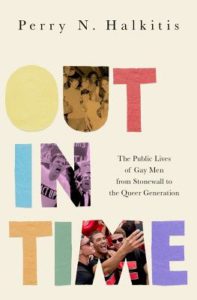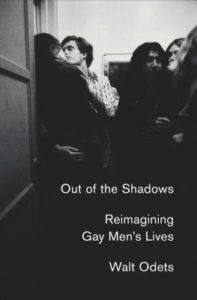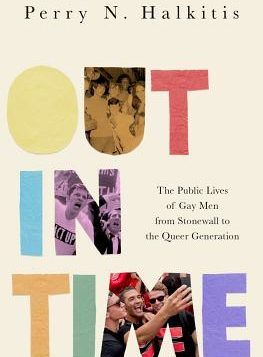 Out in Time: The Public Lives of Gay Men from Stonewall to the Queer Generation
Out in Time: The Public Lives of Gay Men from Stonewall to the Queer Generation
by Perry N. Halkitis
Oxford Univ. Press. 192 pages, $34.95
 Out of the Shadows: Reimagining Gay Men’s Lives
Out of the Shadows: Reimagining Gay Men’s Lives
by Walt Odets
Farrar, Straus and Giroux.
368 pages, $30.
THE LATE ACTIVIST Eric Rofes championed a radical new way of thinking about gay men’s health in his 1998 book Dry Bones Breathe: Gay Men Creating Post-AIDS Identities and Cultures. Rofes wanted us to reclaim gay men’s sexuality and health from under the dark, consuming shadow of hiv/aids. He was realistic that HIV would continue to plague gay men into the foreseeable future, but he insisted that promoting our overall health and well-being was the only sensible way to prevent gay men from becoming infected with HIV, or from not adhering to their medical treatment if they were HIV-positive. Address the “upstream drivers” of risk behavior—depression, anxiety, and childhood sexual abuse among them—and we will make progress; don’t address them, and gay men will continue to bear the greatest burden of HIV in America. Rofes said that gay men’s health programs should include “strong components concerned with substance use, basic needs (food, housing, and clothing), and sexual health (broadly defined).” Rather than focusing exclusively on HIV, the programs would aim to improve the health and lives of gay men. “AIDS,” wrote Rofes, “should be seen as one of many challenges to gay men’s health and our work should no longer position HIV prevention as the overarching focus.”
Two new books echo Rofes’ vision, digging deep into gay men’s hearts and psyches to reveal the wounds we carry and prescribe balms that can heal those wounds. Walt Odets, a San Francisco-based psychologist, and Perry N. Halkitis, dean of the Rutgers School of Public Health, both make it clear that a big part of our healing comes from learning to re-frame our personal stories. Rather than looking at our lives through the lens of victimhood, both authors encourage us to claim the resilience that has let many of us survive and carry on despite the many traumas that disproportionately affect gay men from the time we are boys.
In his earlier book, The AIDS Generation: Stories of Survival and Resilience (2014), Halkitis documented the experiences of long-term HIV survivors. In Out in Time, he separates gay men into three “generations,” each defined by its particular challenges and crises. The “Stonewall Generation” lived with the burden of the closet, challenged to assert their right to live their lives openly and freely. The “AIDS Generation” struggled to survive the deadly virus. And the younger “Queer Generation” have had to find their place in a world complicated by financial crisis and growing income inequality.
But it’s not as though each generation has only its own crisis to deal with. “What’s essential to realize is that these crises are cumulative,” writes Halkitis. “Gay men of the Queer Generation struggle with the primary challenge of their time but still confront the challenges faced by the gay men of the preceding generations, namely acceptance and inclusion within society and the continued battle with AIDS.”
Because each gay man “holds multiple identities that reflect his own understanding of his race, ethnicity, culture, class, and myriad other aspects of being, including his gender identity and sexual identity,” Halkitis says we need a “biopsychosocial perspective” on our health and wellness that addresses these “intersected” identities. His prescription: “Information spread far and wide to help gay men early in their journey—or even later in life—to make healthy, positive choices while experiencing the pleasure of sexual activity and connections without fear, confusion, or shame.”
Out in Time is rich with useful ideas, ready to be put into practice, from a leading writer on gay men’s health within the broader field of public health. It is limited, however, by the small number of men interviewed for the book—only five from each of the three “generations” of gay men—and the fact that they all reside in New York City, so he’s really describing a particular universe. Where else could a young gay man say, as a “Queer Generation” guy did: “If you grow up in an American household that identifies as white, I feel like you can have a coming out experience that’ll be, not only affirming, but like, like wanted. Like, some parents actually want their children to be gay because they think that their kids will live, like, some more fabulous lifestyle than they do.”
From the other coast, Out of the Shadows is author Walt Odets’ own blend of memoir, social critique, and case material from his three decades as a psychotherapist. Writes Odets in his introduction: “It would be a huge exaggeration to say that, today, it’s easy to be gay in America. It is still not easy, unless one comes from the relatively rare insightful family, or one of a handful of educated, socially progressive enclaves.” Like Halkitis, Odets also divides gay men into three generations. But instead of by age per se, he classifies us according to our relationship to the hiv/aids epidemic, as he did in his 1995 book In the Shadow of the Epidemic: Being HIV-Negative in the Age of AIDS, the first book to examine the epidemic’s impact on gay negatives who were nevertheless traumatized by the plague.
Odets also views gay men’s traumas as cumulative across our generations. “What older and young men have not yet adequately outlived,” he writes, “is early-life developmental trauma wrought by families, communities, and the larger society, and the interaction of that trauma with later-life experience.” To outlive these influences, Odets says we must address three things that “have been persistently denied or ignored by a majority of gay men, and by today’s gay community political agenda.” These are the effects of what he calls the “early HIV epidemic,” 1981-1996, on gay men who bore the brunt of the trauma before effective HIV treatment became available; the “late epidemic,” since 1996, when gay men continue to make up the overwhelming number of new HIV infections in the U.S.; and “the still-ongoing childhood and adolescent trauma that gay people are subjected to, and the often-lifelong emotional legacy it bestows.”
Odets says the loss and trauma that older gay men experienced in the HIV epidemic, together with problematic early developmental experience and aging, now “conspire to isolate older-group men in contemporary gay communities.” He tells older gay men to reject the isolation, asexuality, constricted lives, and social invisibility that so many older gay men experience. “Older people,” he writes, “must be active and not wait for—or seek—the recognition, acceptance, and approval of younger people.”
One of the alarming and vexing trends among younger gay men is a high degree of HIV stigma and a low rate of HIV testing. He cites one survey of younger gay men in which forty percent said they would be very or somewhat uncomfortable to have even a nonsexual friendship with an HIV-positive man. If that’s not retrograde enough, he also notes CDC figures showing that young gay men’s lack of regular testing is leading to seemingly rapid 1980s-style diagnoses of advanced untreated HIV disease, aka AIDS, in this group.
Telling and retelling our stories as tales of heroism rather than victimhood is a vital part of supporting our health and community. “These are the stories we should be telling,” writes Halkitis, “the stories of how, despite the odds, so many of us have made our place as contributing intelligent members of society, a trajectory attributable to our resilience and continuous fight to simply be who we are.”
John-Manuel Andriote is the author of Stonewall Strong: Gay Men’s Heroic Fight for Resilience, Good Health, and a Strong Community(2017).






